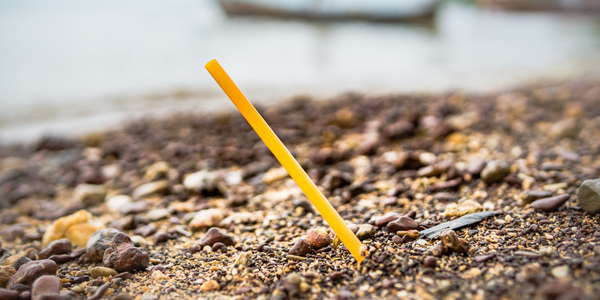What are the alternatives to plastic straws? How does plastic straw usage affect the environment?

Alternatives to plastic straws include glass, paper, bamboo, straw, and metal as well as going without a straw at all. Although plastic straw usage does affect the environment, it is more representative of the overall plastics waste problem in our world today.
Magnitude of Plastic Straw Problem
According to an article in USA Today, more than 500 million single-use plastic straws are used and thrown away every day in our country alone. Although this sounds like a significant amount, it represents less than 1 percent of the plastic waste found in the oceans around the world. The total amount of plastics produced and disposed is even more astronomical.
However, pictures and videos of sea creatures battling plastic straw waste are compelling, and food and beverage companies can tout replacing plastic straws as a proactive environmental action. In addition, straws are less likely to be recycled and more likely to be dangerous because of their smaller size. Tackling the plastic straw problem is a good place to begin, but it’s important to remember that it is just the tip of the iceberg.
Alternatives to Plastic Straws
The easiest way to battle the plastic straw problem is to simply go without. However, consumers who enjoy using straws and individuals with disabilities who need them have a host of new alternatives on the market today.
Straw straws
Companies are offering a new product that’s a throw-back to the original straw: stalks of hollow grain. You can choose completely natural straws made of straw, which are biodegradable.
Bamboo straws
Similar to straw straws, straws made from renewable bamboo are available. These are washable and reusable.
Paper straws
The original paper straw was patented in 1888. Today, they are growing in popularity, slowly replacing single-use plastic straws and made from renewable materials. It’s important to understand that not all paper straws are biodegradable; however, the ones that are will break down in less than three months.
Metal straws
Like reusable drinking bottles, straws made of aluminum, titanium or stainless steel can be used more than once. Durable, occasionally bendable, and easily washable with a special brush, metal straws can be an alternative to single-use plastics.
Glass straws
Another reusable alternative is a straw made of glass. These have the advantage of being able to see if they are clean; however, they are prone to breakage.
Other Actions Needed
Reducing, reusing or replacing plastic straws is a positive first step in battling the world’s plastic waste problem. However, it’s important to complement these efforts with other related initiatives as well. Here are some other areas for improvement.
Easier plastics recycling
The plastics industry encourages communities to find more effective recycling and recovery strategies to curb the disposal of single-use straws and other plastics products.
Support for biodegradable alternatives
According to Stanford University, microorganisms can actually create the material for a biodegradable type of plastic in their cells. Finding ways to leverage these new materials to make cost-competitive products will be critical.
Incentives for sustainable alternatives
Because plastic is such a common packaging material, it is difficult to get away from completely. Both governments and companies must find ways to create incentives for finding alternatives.
Extending the life of durable plastics
Durable plastics are a component of a great deal of commercial and industrial equipment. By focusing on preventive maintenance and caring for the assets and equipment in our homes and workplaces, we can extend their lifespans, generating less overall waste in the long run.
Want to keep reading?
How Much Plastic and Waste Do We Produce?
What are some recent innovations in plastics manufacturing?
How is plastic made?
4,000+ COMPANIES RELY ON ASSET OPERATIONS MANAGEMENT
Leading the Way to a Better Future for Maintenance and Reliability
Your asset and equipment data doesn't belong in a silo. UpKeep makes it simple to see where everything stands, all in one place. That means less guesswork and more time to focus on what matters.

![[Review Badge] Gartner Peer Insights (Dark)](https://www.datocms-assets.com/38028/1673900494-gartner-logo-dark.png?auto=compress&fm=webp&w=336)

Conclusion
Finding alternatives to plastics straws is an easy way to begin addressing the plastics problem. Although companies have started making strides, it’s important that they do not stop with this single issue. Plastics disposal will continue to be at the forefront of this world’s environmental challenges for many years to come.